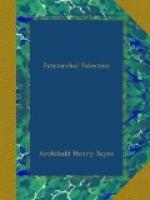Oriental archaeology, at all events, is on the side of those who see in the Hebrew patriarchs real men of flesh and blood, and who hold that in the narratives of the Pentateuch we have historical records many of which go back to the age of the events they describe. Each fresh discovery made by the archaeologist yields fresh testimony to the truth of the Old Testament stories. Since the manuscript of the present work was ready for the press, two such discoveries have been made by Mr. Pinches, to whom oriental archaeology and Biblical research are already under such deep obligations, and it has been possible only to glance at them in the text.
He has found a broken cuneiform tablet which once gave an account of the reign of Khammurabi, the contemporary of Chedor-laomer and Arioch, of the wars that he carried on, and of the steps by which he rose to the supreme power in Babylonia, driving the Elamites out of it, overthrowing his rival Arioch, and making Babylon for the first time the capital of a united kingdom. Unfortunately the tablet is much broken, but what is left alludes to his campaigns against Elam and Rabbatu—perhaps a city of Palestine, of his reduction of Babylon, and of his successes against Eri-Aku or Arioch of Larsa, Tudghulla or Tidal, the son of Gazza ... and Kudur-Lagamar or Chedor-laomer himself. The Hebrew text of Genesis has thus been verified even to the spelling of the proper names. The other discovery of Mr. Pinches is still more interesting. The name of Ab-ramu or Abram had already been found in Babylonian contracts of the age of Khammurabi; Mr. Pinches has now found in them the specifically Hebrew names of Ya’qub-ilu or Jacob-el and Yasup-ilu or Joseph-el. It will be remembered that the names of Jacob-el and Joseph-el had already been detected among the places in Palestine conquered by the Egyptian monarch Thothmes iii., and it had been accordingly inferred that the full names of the Hebrew patriarchs must have been Jacob-el and Joseph-el. Jacob and Joseph are abbreviations analogous to Jephthah by the side of Jiphthah-el (Josh. xix. 14), of Jeshurun by the side of Isra-el, or of the Egyptian Yurahma by the side of the Biblical Jerahme-el. As is mentioned in a later page, a discovery recently made by Prof. Flinders Petrie has shown that the name of Jacob-el was actually borne not only in Babylonia, but also in the West. Scarabs exist, which he assigns to the period when Egypt was ruled by invaders from Asia, and on which is written the name of a Pharaoh Ya’aqub-hal or Jacob-el.




